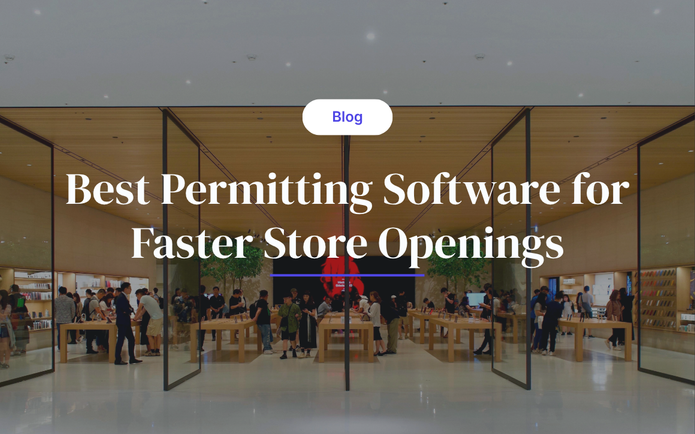The Best Retail Permitting Software for Faster Store Openings

This year, you might be managing over a dozen store openings. Timelines are tight and workflows are messy: one city portal crashes weekly, another jurisdiction is requiring paper submittals. Maybe a consultant misses a deadline, and now your team is scrambling to keep things moving on schedule.
Multiply this scenario across your portfolio, and permitting becomes a multi-million dollar bottleneck.
We all know permitting isn’t just a single task to complete, and it’s often the least predictable part of your pre-construction process. But it shouldn't be the reason your stores can’t open on time.
Where current permitting approaches fall short
Most permitting workflows, whether it’s relying on expeditors and contractors, your AORs, internal teams, or a combination of both, aren’t designed for scale, and not necessarily for speed either
Expediters are inconsistent: Some expeditors are excellent, others aren’t. Their output varies by person and market and there’s no standard for tracking progress across locations.
Spreadsheets don’t scale: Permitting logs require manual upkeep and quickly become outdated. There's no visibility into live application status, upcoming deadlines, or reviewer feedback.
Project management tools aren’t built for permitting: Platforms like Procore or Asana don’t capture jurisdictional nuances, re-submittal cycles, or city-specific documentation standards.
There’s no shared system across stakeholders: Architects, expediters, development managers, and consultants each work in different tools, or no tools at all. As programs grow, so does the fragmentation.
What to look for in retail permitting software
Retail teams use all kinds of software tools to patch together their permitting workflows. Here’s where common software tools rank against key challenges:
Visibility
Teams often use Excel, Airtable, or Smartsheet to track application status. These can work in early stages, but they rely on manual updates and don’t reflect real-time permit progress. Look for integrations that automatically pull live status updates across your sites.
Project coordination
PM tools like Monday or Asana help assign and track tasks, but they fall short when tracking submittal status, reviewers, and jurisdiction-specific workflows. Look for permitting workflows with task ownership built in.
Managing timelines
Some teams use calendar reminders or check in with expediters manually by phone or email. But this reactive approach often misses early warning signs.Look for milestone-based tracking and alerts that help you spot delays before they impact your schedule.
Document tracking
File tools like Box and Google Drive are good for storage—but don’t offer version history, status, or reviewer feedback. Look for document management systems with version history and comments tied directly to each permit.
Scaling programs
Expediters might be effective locally, but their tools and processes rarely scale for teams building nationally. Look for systems that support multi-jurisdiction programs and provide portfolio-level reporting.
While these tools we shared above can each solve one piece of the puzzle, none of them are truly built for permitting workflows. The result is a not-so-ideal process that still often requires manual upkeep and situations where you’re tracking down updates from different stakeholders.
Retail teams are choosing Pulley as their all-in-one permitting solution
Instead of stitching together spreadsheets, project management tools, expediters, and file storage systems, Pulley gives retail teams everything they need to manage permitting from one place, and get approvals up to 50% faster. Pulley’s platform enables real-time status tracking, workflow management, and dashboards to see updates across all your sites in one place.
Pulley's platform offers:
Built-in jurisdictional requirements: Submit complete packages the first time, without guessing what a city needs.
Direct integrations with city portals: CitySync is our direct integration with over 19,000 city portals, and reflects the real-time status of your application.
Task-level coordination and auto-notifications: Know who’s responsible, what’s due, and what’s blocking progress.
Dynamic forecasting and alerts: Anticipate delays and adjust rollout schedules proactively.
Portfolio-level reporting: Roll up performance across programs, cities, and partners without any manual tracking.
We help retailers cut permitting timelines by 20–40%. Read about how Hibbett Sports saved over $200k by shaving 11 weeks off their store opening timeline.
Open stores faster without added complexity
Delays in store openings aren’t just frustrating, they’re incredibly expensive. Lost revenue, idle contractors, and last-minute reschedules can take a toll on every part of your team’s business.
Permitting used to be the least predictable part of getting stores open on time, but it doesn’t have to be anymore. It’s time to replace your piecemeal tracking tools with one structured, scalable system.
Learn more about Pulley and how you can open stores faster and at scale.

How Pulley Works
We're not just software, and we're not a traditional permit expeditor. Learn about how Pulley combines software and local expertise to get approvals faster.
Read MoreKeep reading
%20(580%20x%20362%20px).png)
For the Fastest Growing Retailer in the US, Old Playbooks Won’t Do

What to Expect for 2026 Code Cycle Changes
Get permits. Faster.
Starting today, with Pulley.

